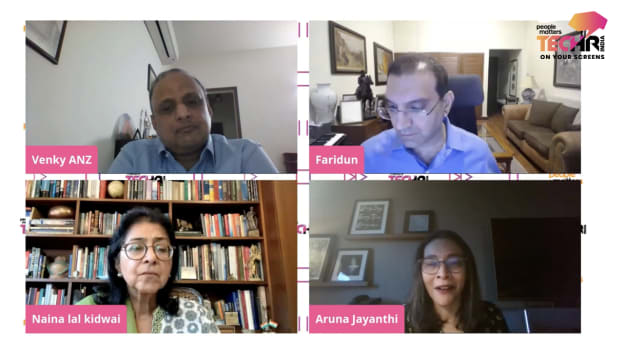HR paving the road ahead to build an agile organisational culture

As we move into the new world of work, one of the key priorities for any organization is to develop agility to keep up with the increasingly rapid pace of transformation. In the CEO Power Panel hosted by People Matters TechHR India Conference 2021 and chaired by Faridun Dotiwala, Partner, Head-Human Capital Practice, Asia, Mckinsey & Co., panelists Aruna Jayanthi, MD, Latin America & Canada Group, Capgemini; Naina Lal Kidwai, Chair India Advisory Board, Advent, Past Chairman and CEO HSBC India; and Venkataram S.V., MD, ANZ come together to discuss and deliberate on what are the business expectations from HR, what makes agility a top priority for CEO’s and how can HR aid in the development of this operational agility.
According to Dotiwala, agility is the ability to quickly reconfigure strategies, structure, processes, resources to the most value adding opportunity. There are four aspects to this: senior leader commitment, focusing on value, being quick and being holistic. Culture and people are important, in terms of building empowerment, creating purpose, carrying out D&I initiatives and encouraging cultural behaviors inclusive of psychological safety, comfort with ambiguity and even the willingness to let go of command and control. As important as it is to recognise this set of ideas and imbibe them into the organisational fabric, there are certain aspects that demand critical attention.
Building agility and empowering teams:
Jayanthi rightly points out that an organisation can be agile only if its team is agile. In this set up of hybrid, borderless organisational models, leadership must not offer instructions to an organisation but rather set a direction. Equally important, as has already been mentioned, is the culture of the organisation in terms of recruitment because hiring and empowering the right set of people will be most beneficial to an organisation. And the way in which we proceed with empowerment, according to Kidwai is to encourage it also in the edges because local decision-making becomes crucial in times of a pandemic when access to remote areas for leadership becomes limited. At the same time, there must be room for mistakes.
“We have to create an organisation that will suffer failure and not punish those with the right intention and right analysis even when the outcome is unexpected,” says Naina Lal Kidwai.
New ways of operating within organisations:
It was only with a strong technology backbone that organizations were able to effectively adapt to the new hybrid model. This is why, according to Jayanthi, organizations have to rapidly absorb technology to change their operations. Data ecosystems with partner companies and logistic supply providers also have to be created.
Encouraging the right set of values:
Venkataram emphasises on the need for a purpose led, value driven culture underpinned by a growth mentality. The right leadership traits have to be cultivated and the values of integration, organisation, collaboration, excellence have to be ingrained as those at the lowest level are empowered and people are allowed to grow selflessly. People have to be encouraged to try new things, challenge themselves as well as build self-awareness and resilience. Diversity awareness and training also needs to be happen as organisations strictly follow the three A’s of inclusion: awareness, authenticity and accountability.
Retaining talent and upskilling:
Soft skills are the most crucial. People must be open to working in a collaborative environment, there must be an entrepreneurial mindset and a greater understanding of the roles of ethics and governance in an organisation. While upskilling is one strategy to retain talent, one must also invest in the well-being of their employees.
Creating a shared purpose:
As organisations are mostly focused on operational efficiency, crafting a shared purpose, a shared clarity which defines the organisation opens the door for a collaborative work environment and aids in the process of cultural transformation. To build a purpose, every single person needs to be seen as a leader and must become a role model. When the right values such as sustainability and inclusivity become part of the organisational fabric, it appeals to the individual purpose of the individual worker and bounds them to the organisation out of shared loyalty and purpose.
The question which becomes central then is how do I link my personal purpose to organisational purpose?
A significant final takeaway from the session is when Venkataram goes on to say that in order to build agility purpose is crucial as well as a growth mindset. To this, if one adds patience and if an organisation chooses to take part in their transformation for the long haul, the rewards can be massive.
Further, on building agility, while Jayanthi stresses on purpose, Kidwai goes on to emphasise the need for understanding collaboration in a digital space as well as connecting with the organisation in terms of ESG (Environment, social and corporate governance). The right people connecting with the right values of an organisation can help in their massive cultural transformation that demands agility.













